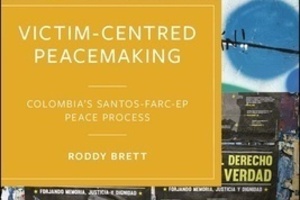Time: Wed Nov 6, 2024, 4:00PM – 5:30PM
Location: Auditorium and Great Hall, Hesburgh Center for International Studies
In this event, professor in the School of Sociology, Politics and International Studies, and director of the Global Insecurities Centre, at the University of Bristol, Roddy Brett will present his monograph, Victim-Centred Peacemaking: Colombia’s Santos-FARC-EP Peace Process (Bristol University Press, 2024), which he wrote during his time as Kroc Institute visiting research fellow (2022-2023).
The book addresses the fundamental question of how, in the face of unrelenting barbary and adversity, survivors of political violence and atrocity have sought to assert agency and contest power as they painstakingly forge a path through which to bring an end to political violence, craft the effective means through which to reckon with the past, and reconstitute their political and moral communities. The book is, in part, about how war is fought, what its impact is, particularly on civilians, and the means that armed groups employ in order to achieve their ends. It is also about how those who survive atrocious violence narrate and make sense of war and attempt to construct peace, and, in so doing, transform political subjectivity, shape formal peacemaking processes and accountability mechanisms, and reconfigure relations of power.
Based on unique empirical research into Colombia’s Santos-FARC-EP peace process (2012-2016), this book interrogates, specifically, how, if at all, survivors and victims may assert agency and contribute to formal peacemaking and transitional justice initiatives. The research argues that victim inclusion – through the so-called victims’ delegations – meaningfully transformed victim-perpetrator relations and dynamics in Havana, while partially shaping the content of both the Victims’ Agreement and Final Agreement. As such, the delegations created paths for empowerment at the individual and, in part, collective levels. However, victim inclusion also precipitated experiences of victim depoliticization, revictimization, retraumatization and instrumentalization. Drawing on insights from across academic disciplines, the book proposes an instrumentalization/empowerment spectrum to analyze the complex impact of victim-centered approaches to peacemaking/transitional justice, and is valuable for both researchers and practitioners.
Brett will be joined by Kroc Institute PhD student, Patrick McQuestion (peace studies and political science) and visiting scholar, Alison Ribeiro de Menezes as respondents. Josefina Echavarría Álvarez, professor of the practice and director of the Peace Accords Matrix (PAM) will provide opening remarks.
This event is cosponsored by the Keough-Naughton Institute for Irish Studies.




